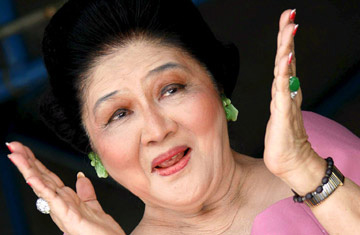David Byrne Meets Imelda
The song cycle Here Lies Love provides a most unexpected pairing: David Byrne, the ageless epitome of American pop cool, taking on Imelda Marcos, the fading icon of 1980s authoritarian rococco. I am steeped with both, admiring Byrne's music (and his patronage of the rhythms and lyricism of the popular music of other cultures); and living for the first 20 years of my life in the Philippines, much of it under the conjugal dictatorship of Ferdinand and Imelda Marcos, And so, I arrived at Saturday night's Carnegie Hall performance of Here Lies Love with more than a measure of trepidation and skepticism. I just didn't think the combination would work. I expected Imelda to be treated as a stereotypical dragon lady or a nutty version of Evita Peron; and I was afraid that the florid Filipino spirit — and the baroque nature of Filipino history — would overwhelm Byrne's music. Indeed, there were moments that a certain hardness came over Joan Almedilla's formidable channeling of the former First Lady of the Philippines, suggesting that Imelda, the former beauty queen, was no more than the proverbial Asian Ice Queen (a Western archetype that goes back at least as far as Puccini's Turandot). But those moments were merely suggestions, small strokes in a rich and rounded portrait of a woman often relegated to cartoon characterization. Byrne's Imelda elicits a percolating empathy: fragile yet ambitious, downtrodden yet proud, weak yet resurgent, betrayed but capable of ferocious revenge. The title song (which quotes the words Imelda reportedly wants on her tombstone) is poignant and silly and hummable — just like the main character, who in life loved to burst out in song and spout outrageous tenets. With almost every number in Here Lies Love the audience was ready to dance, even if it was to a lesson in late 20th century southeast Asian history. Part of the charm was Byrne himself, stopping to provide self-effacing narrative and commentary throughout the performance — a sort of soft-spoken version of Che wandering through "Evita." Byrne's free use of world music tropes and beats — Brazilian and African among them — proved completely compatible with the curlicues of Filipino culture and politics. (There is a lovely moment when the lilt of a verse perfectly replicates the sweet, sing-song of Filipino English.) The music (which includes contributions by Fatboy Slim) does something I thought impossible: translating the Filipino experience into a global medium. It is true to the specifics of what I and my friends in the Philippines lived through and yet it is universal. Here Lies Love is a selection of songs from a project Byrne hopes to stage as a musical one day. It is therefore, by nature, tantalizingly incomplete. The dramatic tension most clearly delineated is Imelda's triangular relationship with her husband and with his archrival (and Imelda's "first love") Benigno Aquino, who was assassinated as he returned from exile to challenge Ferdinand Marcos. But Here Lies Love is ostensibly written around Imelda's relationship with Estrella, the servant who raised her from childhood. However, while several songs deal with this subject, the interaction of the two women feels minor, tangential to the bolder strokes of Imelda's life. (However, the song "How Are You," sung beautifully by Ganda Suthivarakom in the role of Estrella, hints at greater emotional depths.) Also incomplete are provocative allusions to current events such as the U.S. involvement in Iraq. But Byrne is likely to pursue the theme. As he writes in the program notes, Imelda's "is the timeless story of power, politics, and psychological needs. Our own recent history is overflowing with unmet psychological needs. God help us when powerful people act out their issues on a world stage!" Here Lies Love is already promising; if it gets the staging it deserves, it will be stunning. |





